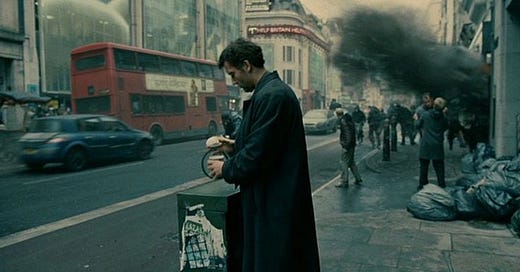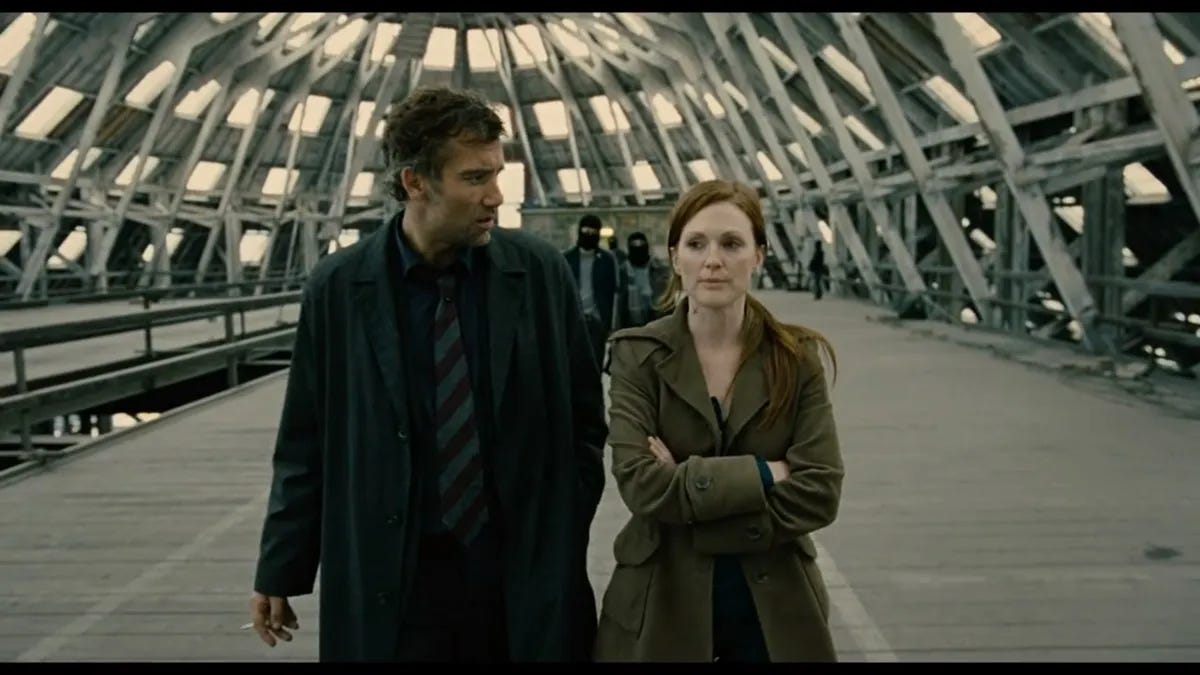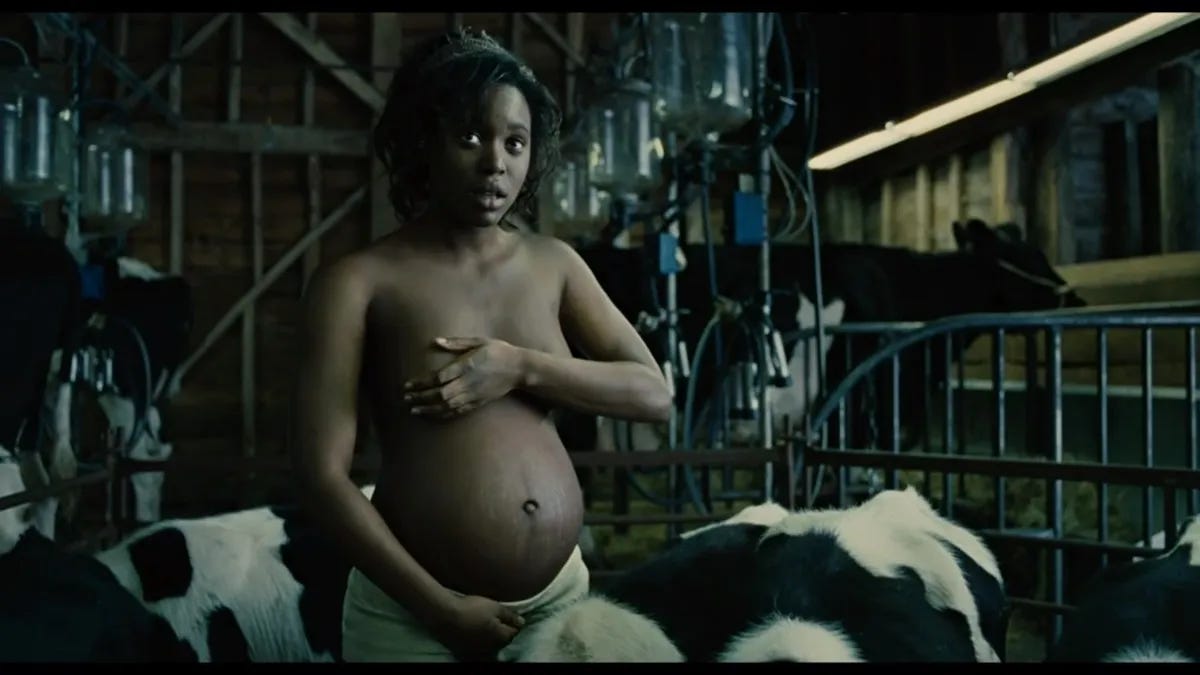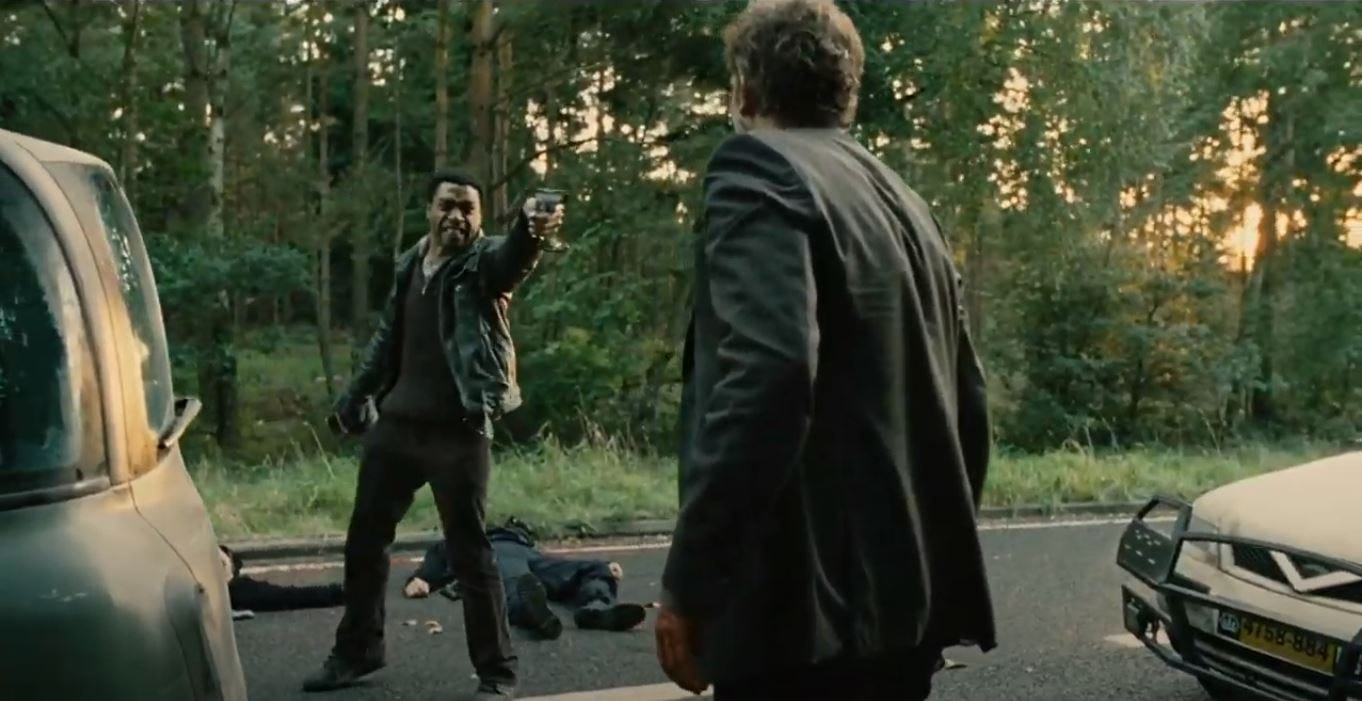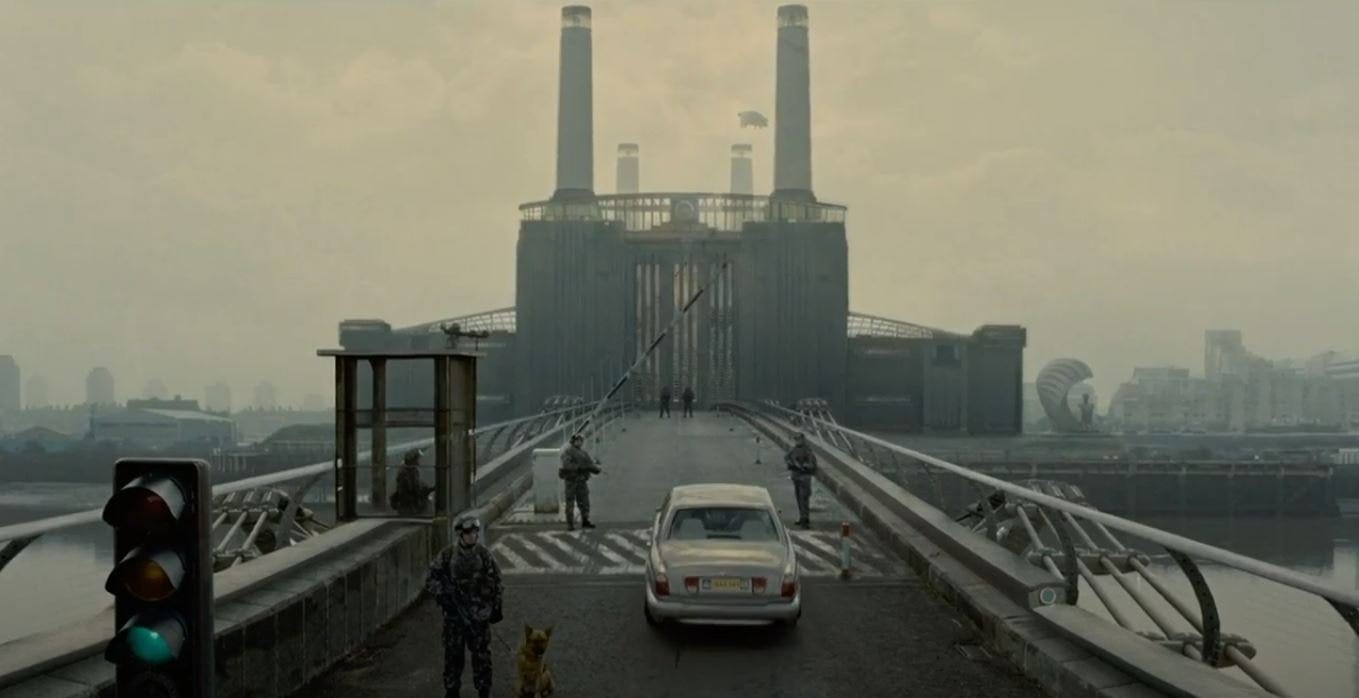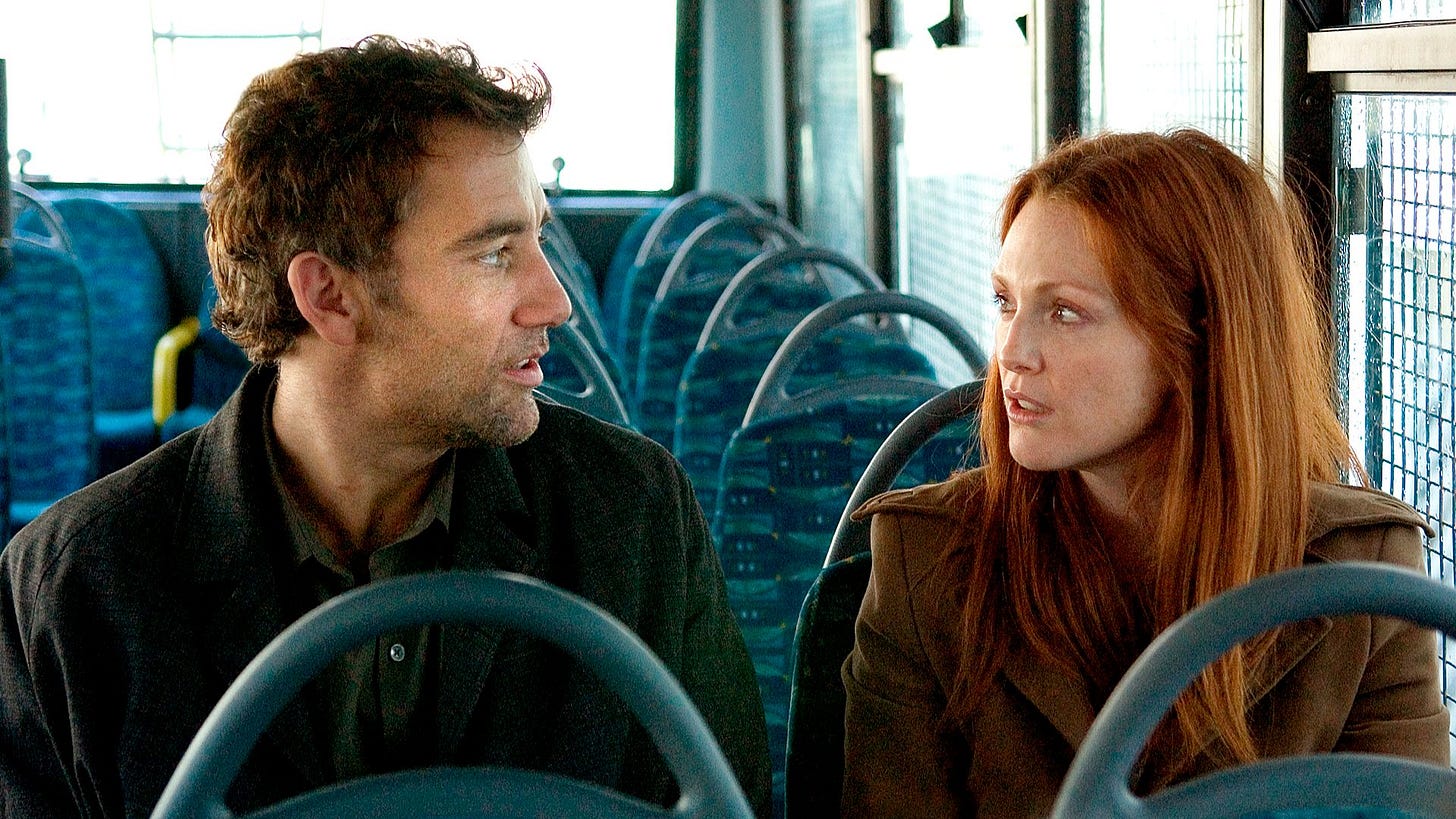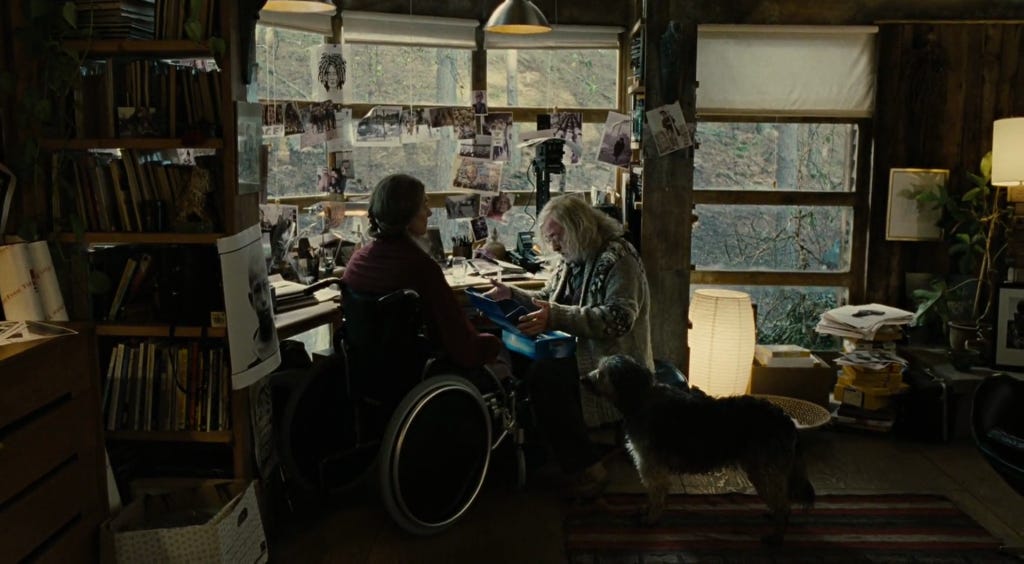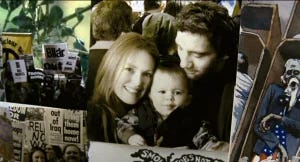Personal Preface
I thought quite a bit on which film I should choose first, an easily overwhelming decision, but I came to a resolution quicker than I expected. I remembered taking “TV Digital Media” as an a elective, that being the extent of my formal instruction on the process of producing a film, along with analyzing and identifying techniques used in them. We were taught what elements could make a work interesting and then used that knowledge to make our own creations. Our teacher closed out a segment with a film he held in high regard. I don’t think at the time I fully appreciated it, but a later re-watch captivated me. I did find things to appreciate the first time, the plot was compelling, the cinematography stood out, but it was the second time around, years later that the subtleties began to hit me, the references, the nuance and the way it all came together.
Premise
Released on Christmas Day 2006, Children of Men is film directed by Alfonso Cuarón based on a Novel by P.D James. Set in 2027, the films opens to a dystopian England amongst a worldwide fertility crisis. Thelonius “Theo” Faron , a former activist jaded by the circumstances of his past. Shortly after Theo is introduced he narrowly escapes the bombing of the coffee shop he was just in, packed with bystanders who had been watching the reporting on the murder of an 18 year old, the worlds youngest person. Theo uses recent event as an excuse to take of of work, but before getting home, he’s abducted by a radical activist group known as the “Fishes” who fight the government, demanding equal rights for refugees. Their leader is Julian who was once Theo’s lover, they dissolved there relationship after the tragic death of there two year old son Dylan. Julian makes a request to Theo, asking him to secure transit papers for a refugee, suggesting that he use his cousin, a wealthy art archivist to accomplish this task. Theo is able to obtain transit paper but they are joint, therefore he obligated to accompany the refugee. Theo agrees to the terms and joins their operation. In a car Theo meets Kee, the young woman who he’ll be escorting but on the way to the first checkpoint they’re ambushed. Julian is shot and killed during the escape. The group arrives at a farm being used as a safe house where in a barn Kee reveals that she is pregnant, stressing the importance of what Julian has asked him to do, get Kee to an organization known as The Human Project.
Themes
Children of Men borrow heavily from religious motifs, particularly from Christianity where it reintroduces the audience to the Immaculate Conception. Other religious influences are present but are centered on the image of faithful Mary carrying within her and giving birth to the savior of the world. For Kee’s safe passage much is sacrifice, with the survival of humanity at stake those involved go to great lengths to ensure Kee gets to the Human Project making martyrs out of many. There is also an emphasis on class warfare and authoritarianism. Due to ecocide and societal collapse across the world, England seeming the only remaining government becomes increasingly totalitarian, ruling over a perpetual police state. In response to the wealth disparity, the discrimination and brutal treatment of migrant, activist terrorist group such as the Fishes are prominent. The state condemns there activities, offering rewards for there capture. The Fishes operate in extreme secrecy, using spies and espionage to accomplish their goals is spite of strict dictatorial measures. While many people such as Theo’s cousin still enjoy opulent lifestyle, holding on to the decadent pleasures of the old world, citizens are forced to cope with their crumbling society, streets are overcrowded, bombing are rampant, and refugees are crammed into cages left begging for food and care. The authoritarian structures seem to lean in to the nihilism that accompanies facing extinction, sponsoring ads for suicide kits to the general public. Members of the “Fishes” constantly stress the importance and utility of Kee and her baby in there aims for rebellion. They put there hope for a successful coup in the child. Another subtle theme is luck. The coffee shop blowing up just as Theo leaves, the mobility and safety he’s temporarily afforded through interpersonal connections, the synergy Theo develops with animals throughout the movie alludes to a divine providence.
Structure and Delivery
The film is captured at all times from an objective perspective following Theo as his presence sets the pace of alongside consequent events. The plot of the film is outlined early on, Theo is abducted by Julian and her team the day he was nearly killed by a bomb and asked to help transport Kee. Once Theo agrees there’s an immediate cut to his meeting with Nigel, his cousin . Director of the Archive of the Arts who so happens to have access to obtaining travel papers. This initial momentum seems to set the stage for the ensuing conflict. The murder of Julian unpacks a mutiny among the fishes in where its revealed Luke, second in command, orchestrated the blockade in which Julian was fatally shot in the neck. Luke’s assumption of leadership establishes an additional immanent conflict as his next order of business is to kill Theo and convince Kee to take his direction. When the Fishes Luke assigned as hit men break protocol and return to the barn, the film uses this narrative to expose the betrayal to Theo who’s investigating the commotion heard outside his window. The film continues on building a pattern of urgent fleeing with brief moments of shelter where plans are made and memories shared. Its when taking refuge at the house of a former fellow activist (Jasper), Theo and Julian’s dead child is mentioned in greater detail. It’s in an abandoned school Miriam ( Kee’s caretaker ) talks about her time as a midwife, working on the front lines of the infertility crisis, steadily seeing more and more miscarriages until no devilries where being scheduled. The films linear trajectory gives little room for suspense and major events occur abruptly, consistently using the element of surprise to move the plot along. There is little to no foreshadowing, instead it seems the film references itself to link scenes and information together. For example Kee throughout the journey names the baby several times but it isn’t until the very end does she confidently settle on Dylan, a tribute to Theo and his deceased son. The film wastes no time getting to the point, without leaving out foundational information, its speed is tempered with punctuality, sustaining it’s tempo and narrative integrity with thoughtful exposition.
Imagery
Children of Men departs from the typical Sci-Fi aesthetic, expressing visually in respects to classicism. Grading the film are blueish green tones paired with a slight desaturation that still allows for an occasional vibrancy, reserved for more tender moments. The lighting is even in most scenes giving them natural appearances in accordance to the English Isle. There is a smoothness despite the rugged dilapidated ghettos and war torn blocks, a contrast kept in balance. Since a majority of the film takes place outdoors, interior lighting is sparse but is consistently low-key, allowing for depth creating shadows while softly highlighting the points of interest. To the credit of cinematographer Emmanuel Lubezki the Children of Men is on record to have one of the longest continuous uninterrupted shots ever on film, bringing to this set his unique style and professional experience. Steadicam and Gimbals are a constant, contributing to the hurried and frantic sensation felt by the protagonists throughout the entirety of the film. The handheld tracking and panning gives a sense of immersion paired with the wide lenses that give context to the narrative. The opening scene tracks Theo leaving the coffee shop, matching the rhythm of his steady gate as if an invisible character following him, Theo stops to stir his coffee, the camera pans as it moves ahead of him, framing the traffic in the streets, the passerby’s on the sidewalk and the row of shops he just past, this sets up the shot for the following explosion, the camera rushes up to the aftermath visibility bobbing left and right, the audience is given a first person perspective of the chaotic world this character inhabits as if accompanying them. I managed to spot only one instance of a tripod in use, this is when Jasper is being interrogated by Luke surrounded by the other fishes outside his home. The camera is placed in the distant tree line where Theo and the others watch from afar. The stillness of this shot builds tension, here also is the only zoom I came across, setting it apart from all other scenes in the movie. The shooting style in Children of Men is straightforward yet full of character. Wide angles capture the gravity of the story, the medium shots find there place amid dialogue and in exchange for tighter angles, the Steadicam’s and Gimbals move the audience in the developing scene. Also straightforward is the editing. Long take are common place, this is part of the cinematic language that Mr.Lubezki and other executives chose to incorporate. Cuts take place when necessary. The imagery in Children of Men along with the techniques used to achieve them are not reinventions but they are paired in unique ways that give its surreal narrative a sense of believability.
Characterization
The characters in Children of Men come as they are, developing in context to there role, for some that’s the role of a martyr, aggressor/oppressor, or a characters in which the highest of hopes are placed. Kee is the central figure in the plot, though it can be argued that Theo is the protagonist, the main characters act in relation to her. It isn’t long after we’re introduced to Theo and his circumstances that his path is joined with Kee’s, His aloofness and dismal attitude are the defining feature the audience is at first presented with, it isn’t until his reunion with Julian that we see there is more to Theo than his cold cynicism. Characters such as Julian and Jasper help us to understand more of who Theo was and is. In a brief scene on a bus, the audience discover that Julian and Theo had a child who died, and that this devastating event lead to their splitting apart. For a short moment we see the effect that this old wound has on Theo as an argument ensues. Later on as the two begin to reconcile, Theo asks whats to become of there relationship after delivering Kee to her destination, to which she replies “I don’t know” and then kisses him. This sudden affection is a glimpse at the complicated relationship of a couple who’ve been apart more than 20 year, reconnecting under dire circumstances. Julian’s trust in Theo adds to his character as well, being former activists they both shared a similar passion that set the foundation for there relationship, one that held even 20 years later. Julian’s faith in Theo is echoed through other characters, namely Kee and Luke. Julian doesn’t have much screen time compared to other characters but her determination, compassion, and sense of duty are set in precedent to her demise, her position within the Fishes highlight her skills as a leader and her life long commitment to activism, even in its more extreme forms. Julian’s care for Kee exceeds that of a political goal and her foresight acts as a defense from the machinations of Luke who violently usurps her. The trinity of Theo, Kee and Julian establishes the plot, the supporting characters add to or subtract from their struggle with varying relevance. The character Jasper provides a setting for both comedic relief and a closer look at what we already knew about Theo. Jasper is a connection to Theo’s past through which the audience discovers more about Theo and Julian including their work before catastrophes occurred. It is implied that Jasper is an emotional refuge for Theo and then later a physical one, underpinning his outrage when he’s murdered unremorsefully. Luke serves a more subtle role in the beginning of the film, at first seeming doubtful of Julian’s choice to bring Theo onboard but ultimately cooperating with her leadership and command, when it’s revealed Luke is only feigning to oblige, the audience is shown his lesser known attributes, his rage, desperation, and manipulative tendencies. Luke’s betrayal creates a coinciding conflict for the main characters. With Luke leading the Fishes, the characters introduced as allies take on new meaning and new roles. The film reiterates its volatility by negating the false sense of comradery that Kee, Theo and Julian were thought to have in the beginning of the film. Miriam does remain an ally, her motivations are primarily spiritual likely leading to her decision to join Kee and Theo as he flees from his impending murder. Her time as a midwife is what prompts her strong connection to Kee. That paired with her zealous nature justifies her position as Kee’s caretaker. Whether Miriam’s faith had a tangible effect is uncertain, but in moments like her final scene where she calls out to St.Gabriel to protect Kee from a Bexhill officer, we see that her dedication to Kee and her due child is unwavering, she is willing to sacrifice herself in the name of that which transcends her. Through Miriam the audience can observe how spiritual themes and motifs have syncretized likely due to the calamitous state of the world. When the fish convene to discuss their next course of action and quite possibly the fate of humanity they let Kee decide weather she will stay on the farm or leave, When Syd previously indifferent to the details of deal he’s made with Jasper discovers that Kee has had a baby, his demeanor changes an he becomes frantic and irritable. Marichka, the proverbial inn keeper takes on a more active role in Kee’s protection after witnessing her child. From the beginning Kee is introduced as strong willed and shrewd. Her past as a prostitute although in a way hardened and numbed her, she reveals to Theo the feeling of aliveness she felt when the baby kicked. Even with the larger implications that Kee’s pregnancy has, her character is not completely defined by it and is allowed to have definition beyond religious specificities. The film makes it clear that the future of the world hinges on one person and that is Dylan, named in respects to Theo and Julian’s deceased son, Dylan and Kee’s existence is the catalyst for Julian’s plan, for Theo’s path and the possible redemption of the world.
Sound
The soundtrack the film presents varies widely, from electronic music to classical, catering to the mood on scene. Always in queue is an orchestral score underlining significant events and accentuating spiritual themes. Throughout the movie, are several auditory motifs, the first being the a ringing in Theo’s ears caused by the bombing. Julian warns Theo of what this means, “a swan song” indicating the lost ability to hear certain frequencies. The ringing reappears in the ambush scene as Julian bleeds out, implying the loss Theo then faces. Another motif that can be found are the sounds of different animals, barking, mooing, crowing are on cue with events taking place, the audience can here them as Theo,Kee,and Mariam are escaping the farm, or when Marichka’s dog sounds off in the presence of the newborn. Music is placed in direction to scenes, for instance when Theo is riding in the back of a luxury vehicle sent by Nigel, “The Court of the Crimson King” by King Crimson plays, the lyrics and feeling the song gives matches with the disarray Theo witnesses outside the vehicles window. As he approaches a character who has reserved his place among the elites, the lyrics of the song mirror the declining society and the disparity between commoners and aristocrats. The film makes it known through the music that Theo is crossing a class barrier, one of few to do so. Gunfire and explosions are rendered as the frequent backdrop in Children of Men, contributing to that sense alarm and urgency moving the plot along. The final act of the film feature all out firefights that the protagonists are caught in the middle of, to the point where newly born Dylan begins to cry, a sound that people haven’t heard in years or never at all. Refugees who moments ago where frozen in terror, caught in the middle of gunfire and tank shells are now silenced by the cries of a child, captivated in reverence
My Take
As I mentioned in the beginning of this post, it took another viewing at a later time for me to better process this film, maybe I had lacked the emotional depth or simply the maturity, so it came as a shock to me how deeply affected I was the second time around..the third and fourth. With dystopia as the backdrop I watched characters in this film struggle to preserve humanity within themselves and ultimately through the birth of a miracle. Urgently delivered is story about the fragility of our species along side our resolve for dignified survival. The saint like selflessness depicted in Children of Men is moving. The spiritual resonance in this film is clear with its overtly Christian symbolism that incorporates other traditions as well. That inclusivity further adds to the thematic underpinnings displayed. Alfonso Cuarón decision to have Kee played by a black woman doesn’t seem to me one made for the sake of shock value but the reassertion of spiritual doctrine, and the idea that salvation doesn’t exclude the meek and may well come from them. The characters are running on hope and a prayer. “Om Mani Padme Hum” chant Miriam and Kee on there way to the Human Project, uncertain if it really exist, yet they act on their faith in Julian who puts hers in Theo. With one tragedy after another the audience is left to speculate how the odds could ever be in the favor of their survival, truly an open ended inquiry. From the very start the camera is honed in on Theo and doesn’t let up as neither the opposition or the urgency do. I felt engaged watching this film, especially this time around, there where so many slight of hands made I couldn’t have caught the first time. Now having listened to Pink Floyd years later, the shot of Theo and his cousin Nigel against the Battersea Power station is much more satisfying, and the symbolism of oranges shared with Kee in reference to fertility. It was rewarding for me to keep up with the pace of the film, every frame felt very intentional, the dialogue said what needed to be said with drive-by emotional depth then let the action take center stage. The shooting style is standout, Emmanuel Lubezki demonstrates his hard won technical proficiency extensive action scenes that dare not to cut.
Children of Men was a film of its time yet is still relevant today, (which makes sense since its set in 2027) wars still rage, climate disaster cripples infrastructure, refugees of all kinds flee from devastation of all sorts looking to emancipate themselves from seemingly endless strife in their homelands. As recent global events have displayed, the order of human dominance can be severely threatened at any time, our systems can be rendered useless and ways of life halted with little to no warning. That's why I find this film so comforting I’m reminded how very real and powerful faith is and the tenacity of genuine human connection. We carry within us the highest hopes of previous generations, we cant always realize them but what we can do is pay that respect forward in our treatment of ourselves and others. If anything is to survive of us I could reconcile with it being our ability to deeply care for one another.

